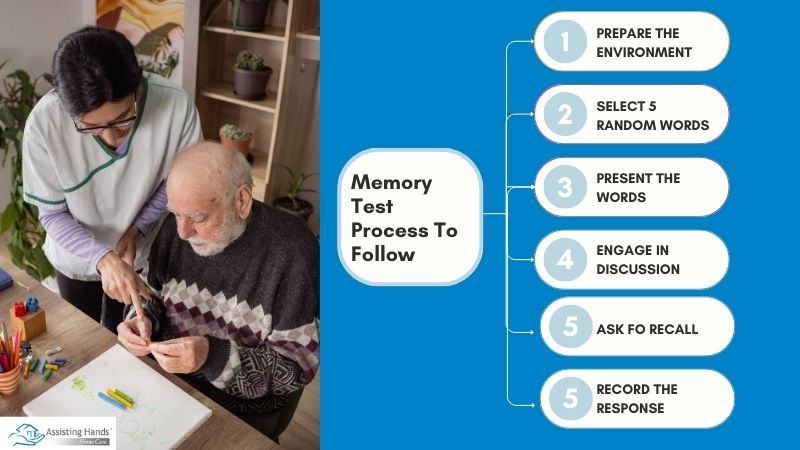
Key Summary: Memory changes are a natural part of aging, but they can sometimes raise concerns. The 5 Word Memory Test is an easy and effective way to assess someone's memory. In this test, a person is asked to remember five unrelated words and recall them after a short distraction. While not passing the test doesn’t necessarily mean dementia, it can point to potential memory problems that may require further evaluation. Early detection of cognitive decline allows for better management of symptoms and the opportunity to make lifestyle adjustments to improve overall quality of life. Assisting Hands provides dementia care for seniors living in Palos Heights, IL.
As seniors age, memory becomes a growing concern for both individuals and their loved ones. It's a natural part of the aging process for memory function to change, but these changes can sometimes be worrying. For many seniors, forgetting names, misplacing items, or struggling to recall recent events can be frustrating and even impact their daily lives. Additionally, concerns about memory loss often extend beyond just forgetfulness, as they may signify more serious cognitive issues. As such, maintaining cognitive health and monitoring memory function becomes increasingly important as individuals enter their senior years. That's where simple memory tests like the 5 Word Memory Test come into play and evaluates memory efficiency.
Table of Contents
ToggleWhat is the 5 Word Memory Test?
How to Perform the 5 Word Memory Test With Your Senior?

If you're concerned about your senior loved one's memory, giving the 5 Word Memory Test a try is a good way to start. This simple test can give you insight into their memory function without being too intrusive. Here's a step-by-step guide on how you can do the test.
Prepare the Test Environment
Creating the right environment is essential for an accurate assessment.
- Choose a Quiet Space: Find a location free from noise and distractions. This helps the senior concentrate better.
- Ensure Comfort: Make sure the senior is seated comfortably. A relaxed posture can enhance focus.
- Set a Positive Tone: Approach the test with a calm and reassuring demeanor. Explain that this is just a simple exercise to understand memory better and there’s no need to worry.
Select Five Unrelated Words
The choice of words is essential for the test’s effectiveness.
- Common and Familiar Words: Select words that are easy to understand and remember. Avoid complex or unfamiliar terms.
- Unrelated Words: Ensure the words have no obvious connections to each other. This prevents the use of mnemonic devices that could skew results. Example: Cloud, Chair, Pencil, Flower, Sand, Book, Rain, Cheese, Bicycle. Write these words down for your reference, but keep them hidden from the senior.
Present the Words
Introduce the words clearly and slowly to the senior.
- Speak Clearly: Articulate each word distinctly, ensuring the senior can hear and understand each one.
- Pace Yourself: Pause for about one second between each word to give the senior time to register each word individually.
You might say: "Please listen to these words carefully and try to remember them: book... Chair... Pencil... flower... rain."
Engage in a Short Distraction
After presenting the words, introduce a brief activity to temporarily shift their focus.
- Choose a Neutral Activity: Engage the senior in a task that is simple but distracting enough to shift their immediate focus from the words.
- Examples of Distractions: Ask them to count backwards from 20, discuss a recent event, or ask about their day.
This step typically lasts for about 1-2 minutes.
Ask for Recall
Now, ask the senior to recall the words you previously mentioned.
- Prompt for Recall: After the distraction, say, "Can you please tell me the five words I asked you to remember?"
- Be Patient: Allow them ample time to think and respond. Do not rush or pressure them.
Record the Responses
Document the words they recall accurately.
- Note All Responses: Write down every word they remember, including any incorrect words.
- Observe Cues: If they struggle, gently prompt them for more words, but note the need for these prompts.
A score of 100% means all five words are recalled in the correct order. Remembering three words is normal, while recalling one or two words is a cause for concern.
Is the 5 Word Memory Test a Diagnostic Tool?
Failing the 5-word memory test does not always suggest dementia. However, it can reveal problems with memory that a physician can check. Other causes, like depression or thyroid issues, can make recalling these words difficult. Or the individual may be a poor test taker.
The 5-word test is not a diagnostic tool in itself. It can point to issues with memory or cognitive function but should not be used alone to indicate dementia. A comprehensive evaluation by a physician is necessary to diagnose dementia or cognitive decline.
Dementia is diagnosed through complex testing, including physical and psychiatric examinations, memory testing, and laboratory testing. Brain imaging is conducted through MRIs and CT scans. Other conditions that mimic dementia, like vitamin deficiencies and traumatic brain injury, are also eliminated by a physician.
How is the 5 Word Memory Test Helpful?
Although the 5-word memory test can at times point to a false alarm, on other occasions it can quickly assess a senior’s cognitive health. This is because the test focuses on the older person’s delayed recall abilities and short-term memory.
In addition to the 5-word test, the Mini-Mental Status Examination (MMSE) is used to assess cognitive health. The MMSE is a common test that evaluates skills, such as reading and writing, as well as orientation and short-term memory. The clock test is another tool to gauge memory skills.
A senior’s memory skills are at the forefront in the 5-word memory test. When combined with other tests and a physician evaluation, the test can help detect early signs of dementia. This leads to early intervention, which may include today’s medications that are most effective at the early stage.
How is Early Detection Beneficial?
Managing symptoms of cognitive decline effectively is another benefit of early intervention. The older adult has the opportunity to make lifestyle modifications and adjustments in advance. Making helpful changes has the potential to lessen or even delay some symptoms of dementia.
Families and their aging loved ones can better plan for the life changes dementia brings. They may hire professional memory caregivers, for instance, to assist with daily activities at home. Seniors can learn about dementia, which gives them a better ability to cope with symptoms.
Individuals may even participate in clinical trials, joining others in seeking new treatments and better diagnostics for dementia. Participating seniors might receive cutting-edge treatment themselves as they continue the search for a greater understanding of dementia, better treatments, and enhanced care.
Why Take the 5 Word Memory Test in June?
There’s no better time to take the 5-word memory test than in June, during Alzheimer’s & Brain Awareness Month. The Alzheimer’s Association encourages seniors of all ages to take charge of their cognitive health. Steps can be taken to reduce the risk of cognitive decline.
If older adults experience problems with thinking or memory, as revealed by the 5-word memory test, it’s important they speak to their doctor. Do not wait until symptoms of mild cognitive impairment worsen or family members express concern to get checked.
Dementia Care From Assisting Hands
Early detection of dementia gives seniors more time to plan for their future. Families and their elderly loved ones may look into memory care from Assisting Hands Home Care as a potential source of in-home support. We offer compassionate dementia care to seniors in the comfort of home.
Our dedicated caregivers are trained to identify and manage symptoms of dementia. When seniors wander, we gently guide them back to safety. Caregivers discreetly and respectfully handle the incontinence issues that arise with dementia. We reduce agitation with distraction techniques.
Memory care from our reputable home care agency includes help with the activities of daily living. We prepare healthy meals, give timely medication reminders, perform light housekeeping, and shop for groceries. We also provide transportation and escort to doctors’ offices or to conduct errands.
Senior companionship is a vital part of our senior home care services. Caregivers hold pleasant conversations, play card games, and take seniors on outings to stimulate their minds and engage them socially. Our efforts prevent the elderly from feeling lonely and isolated.
Caregivers are licensed, bonded, and insured to give families maximum peace of mind. Care options are flexible and meet the various scheduling needs of families. In addition to dependable memory care, our home care agency offers Parkinson’s care, which includes the abovementioned services.
When your aging loved one takes the 5-word memory test, it may indicate a need for dementia care in the future. Choose Assisting Hands Home Care, like so many satisfied families in Palos Heights, Romeoville, Homer Glen, Tinley Park, Lemont, Illinois, do. Schedule a free in-home consult today and learn about our quality memory care services. Call us today at (773) 207-3767















